New York City, February 28, 2013

★ Which part was supposed to count? The glorious late morning, when the sunlight found translucence even in the muddy water being splashed by an excavator in the flooded end of the construction pit? The earlier morning, cool gray and promising comfort? Those pleasing prospects were lost in the cold indecision of afternoon, as tiny sharp raindrops feinted at the possibility — never fulfilled — that things would turn seriously for the even worse.
The Real Weird Twitter Is Espionage Twitter
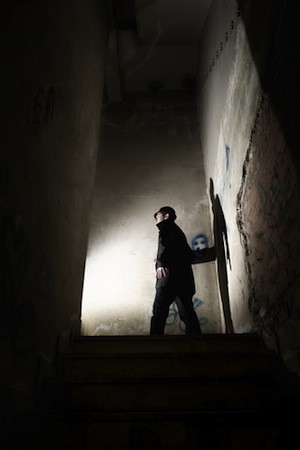
The concept of people typing Dadaist humor on Twitter has existed since Twitter got its first big batch of smart-ass users in 2007, at that year’s SxSW. Twitter was suddenly the place to get breaking news on inconsequential online-media events. Also, it was full of banter and inside jokes and drunken jabbering. It became fun, because a lot of bored funny people now had a way to narrowcast every oddball thought to people who might appreciate that kind of nonsense.
Only last year did anyone refer to this as a certain thing, Weird Twitter. My own Twitter feed has always been weird, because I follow a lot of humorists and New York bloggers and alcoholics. There’s something about the intentionally wrong style of idiotic comedy that makes me laugh like nothing else. “A little of that goes a long way,” my comrade Alex Balk said when I showed him @Seinfeld2000, the surreal mirror to the much more popular @SeinfeldToday, which put the 1990s characters in today’s barely changed world. But not for me. I laughed at every single tweet, sometimes to the point of actual tears.
Still, I prefer things to be weirder, so I kept looking for the portal to this alleged Weird Twitter and finally realized it was mostly stuff I already followed. My search for unintentional weirdness finally led me to a truly inexplicable Twitter, full of ‘bots and coded messages and mysterious numbers that brings to mind the shortwave spy stations immortalized by the Conet Project. And why are so many of them scary?
The Iowa City Enigma

The enigma of “Iowa City schools ask state for an audit” was pointed out by @cjohnson319. These tweets just repeat that phrase, and the accounts don’t appear to have any connection to Iowa City or its schools. The phrase is a headline from a story about auditing Iowa City’s schools, found on the Quad City Times of September 1, 2011. The article has no comments and has not been shared on Twitter, Facebook or Google+. It’s just sitting there, the apparent source of inspiration for endless tweets from far-flung accounts.
“Moriah Odonnell,” for example, claims to be in Sao Vicente, which could be in Brazil or Portugal or an island near Cape Verde or probably a lot of other places with Portuguese place names. Moriah, if that is his or her real name, posts nothing but nonsense like this. It’s not funny, and it’s not intended to be funny. Of this user’s six followers, two use Portuguese in their profile; one claims to be located in São Paulo, and also posts random phrases and quotations in multiple languages.
I think it’s safe to say that Moriah Odonnell is a lonely spy under deep cover in some colonial hellhole. Either that or the random spew of a pointless botnet.
What does it mean when these accounts — seemingly spread all over the world — spit out this phrase about Iowa City schools? Is the drug plane about to land, somewhere? Has another priest been taken into custody and the militia activated?
GooGuns
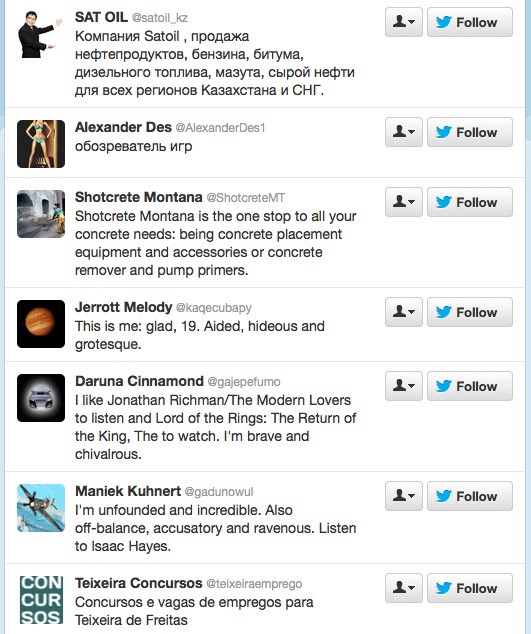
Here are some of the 38 followers of an inscrutable account called @googuns_staging — many of these are obvious fraudulent accounts with randomly generated profiles such as, “I like Jonathan Richman/The Modern Lovers to listen and Lord of the Rings: The Return of the King, The to watch. I’m brave and chivalrous.” Well, of course you are!
GooGuns posts nothing but strings of letters and numbers, like b39e65fa00000000 in intervals of about five minutes on average. The string of characters always ends with zeroes, occasionally with the location service turned on, so you can see that 554705fa00000000 was allegedly tweeted from the “Region of Khabarovsk.” This has been going on all day and all night, for years, with more than 318,000 tweets posted since 2009. But why?
There is an iOS game called GooGun with its own website and a dubious iTunes graphic with the words “No Longer Available” over it. “Space robots are attacking,” says the promotional video showing game play on this game that is not available to play. Space robots … and they’re attacking? Are those GooGun staging numbers and letters a hint to where they’re attacking? Also, is there a new street drug called Space Robots? Because if there is, this may be a window into the international trafficking in that terrible scourge of modern society.
US_CIA
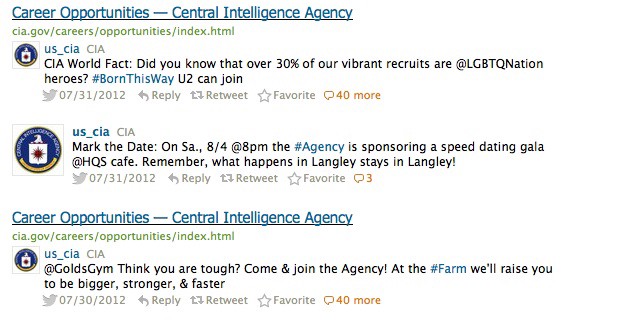
The greatest Intelligence Agency use of Twitter that never really happened is @US_CIA, a remarkable account that posted plausible Langley public notices that became noticeably stranger over time. Eventually it was claiming 30% of all CIA employees were LGBT and/or First Nation and tweeting directly to @khamenei_ir, Iran’s ayatollah.
Washington Post intel reporter Greg Miller asked the CIA about the account, which immediately vanished.
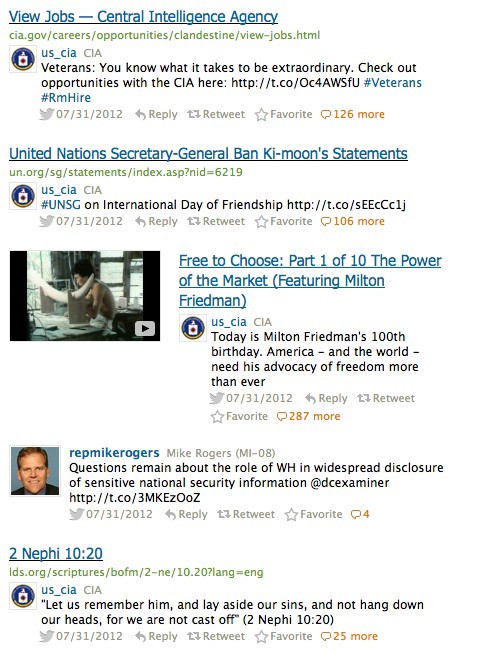
These were jokes meant for people with inside knowledge of the CIA — jokes about hiring practices and the fact that Mormons are seen as good recruits because of their clean living. Whether the person behind this account was inside or outside the agency is another mystery: When you’re dealing with international espionage, a parody Twitter account can also be psychological warfare.
***
Whether failed spambots or coded espionage messages or political propaganda, an interesting fact about these bizarre Twitter accounts is that programmers don’t seem to know what’s up, either. Comments on Slashdot and HackerNews show a huge variety of opinion as to what these things are and what they may be attempting to accomplish.
Maybe it’s all nothing. Just don’t ever tweet “BEETLEJUICE BEETLEJUICE BEETLEJUICE!”
Photo by Antlio, via Shutterstock.
[SPONSORED] 20 Great Coming of Age Characters
by Awl Sponsors
“While the fringe jackets and bell bottoms may have changed to purple leather, poofy hair, and shoulder pads and the soundtracks have evolved from The Partridge Family to Tom Petty to Simple Minds, transitioning from adolescence to adulthood is a universal experience, and you can learn a lot about someone (more specifically, which decade they grew up) based on their favorite coming-of-age films and television shows. In anticipation of IFC’s new series ‘Out There,’ here’s a look at 20 memorable characters who came of age onscreen, in no particular order.”
Reckoning With 'Thelma & Louise'
Reckoning With ‘Thelma & Louise’
by Maud Newton and Carrie Frye
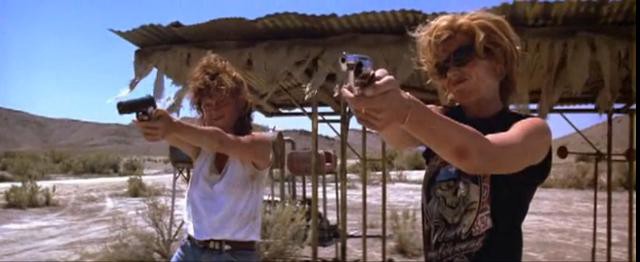
Carrie Frye: Maud! I rented Thelma & Louise a few weeks ago, and it was, weirdly, only on rewatching that I realized why every so often I get an irresistible urge to rent an aqua convertible, conscript a few female friends for the trip and just drive… south, west, wherever: it’s because of Thelma & Louise! It should have been the obvious source of the daydream, but I had lost track of the full extent to which this movie had hardwired my brain. It’s been 21 years since it came out — it is now old enough to walk into a bar and order a Wild Turkey straight up and a Coke back. I have no memory of when I first saw it — my first distinct memory about it is of listening to two college friends — older, sophisticated (we were all young enough that someone being a year ahead in school made them “older”) — discuss whether they’d be ‘Thelma’ or Louise.’ (There’s a continuum here going back to grade school when you had to call whether you were ‘Kelly,’ ‘Jill’ or ‘Sabrina.’) When I mentioned I was watching it to you, you were able to immediately quote a bunch of favorite lines — which made me think that Thelma & Louise might very well have hardwired your brain, too. If I correctly remember all the concerns swirling around this movie when it came out, that can only mean a dire ending is in store for us both.
Maud Newton: Wait, hold up, Carrie! You didn’t answer the question. Would you have been Thelma, or Louise?
The conclusion to a short series about our strongest movie opinions, past and present.
Carrie: Well, I think that’s partly why I still remember the conversation: listening, I couldn’t decide. I probably leaned Thelma then (a gawky, friendly overpacker, sometimes capable of robbing a store); older me slants more Louise (don’t we all?).
Maud: Obviously I was born Louise. Except that she’s really tidy and I am way too uncoordinated to wait tables. I love how she’s so grimly determined to have fun on this trip that is designed, fundamentally, to make Jimmy miss her.
Carrie: The excellent description of her, from the waitress where they stop for drinks: “The smaller one, the one with the tidy hairdo.” (The same waitress also discloses that Louise had, of course, left her an exorbitant tip.)
Maud: Thinking about your convertible hankerings, I wonder if I started smoking because of this movie. My sister came to visit in the summer of 1993 and for a week we ignored my boyfriend and slept all day and stayed up all night, ordering pizza and watching and rewatching it on video. I remember the two of us lavishing particular delight and rewind attention on the part where Louise narrows her eyes at the guy who’s hitting on Thelma (“what are a coupla kewpie dolls like you doing in a place like this?”) and exhales a big cloud of smoke into his face that makes him wince. “If you don’t mind,” she says, “I’ve got somethin’ I’d like to talk to my friend about in private.” So passive-aggressive and aggressive! I haven’t had a cigarette in almost seven years, and I can’t think of anything that makes me want one as much as that scene does. Luckily, after 13 years of living in New York City, I have learned many other ways of dispersing assholes. I used to be much more Thelma-like in those situations.
But aren’t all the 90s touches great? Geena Davis’ 80s holdover Guess jeans! Susan Sarandon’s fabulous sunglasses. Jimmy’s Elvis Presleyesque haircut and vest thingie. Brad Pitt’s implicit tutorial on how to wear a chambray shirt (basically, be a young Brad Pitt, hitchhiking).
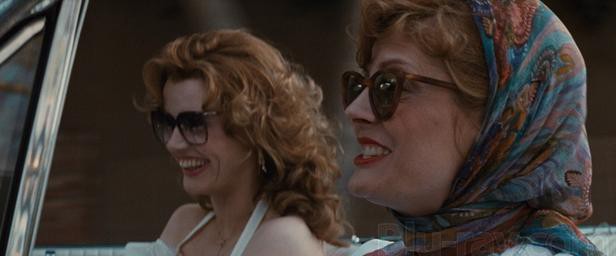
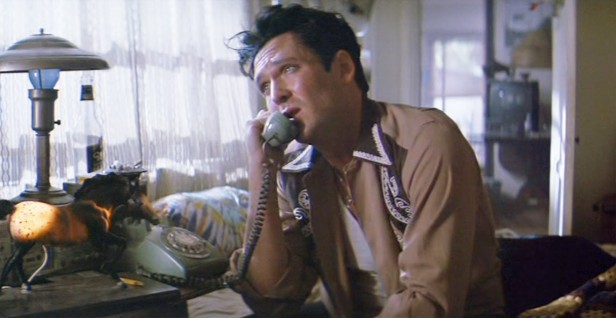
Carrie: Charlie Sexton as the singer at the local bar!
Maud: Singing John Hiatt!
Carrie: Speaking of 90s touches: In 1991, we were two years past Sinéad O’Connor singing “Mandinka” at the Grammys (are those stonewashed jeans Guess?), and only a year away from her tearing up a picture of the Pope on “SNL.” In a couple years, I’d be having earnest discussions with friends about whether Courtney Love’s nose job (undergone pre-Live Through This) would or would not better enable her to disrupt The System from the Inside, as she’d told Rollerderby was her plan. (We were leery.) I mentioned this movie as hardwiring me; but then it came along at a time when I was so wildly receptive.
Maud: God, so true. When it came out, I was really getting into my Women’s Studies minor. You know, denouncing the patriarchy, feeling guilty for wearing makeup and shaving my legs, advocating the overthrow of language (though Cixous and Irigaray never explained how exactly this would work and I didn’t have any real ideas of my own). Weirdly, it turned out that being furious and resentful about gender inequality didn’t lead to my feeling empowered or energetic or to good decisions of any kind. I spent most of my free time fighting with my boyfriend.
I was instantaneously obsessed with Thelma & Louise. At the time it felt so true and like such a validation of everything I was learning about oppression.
Carrie: Yes! I have an acute memory of going to a packed lecture that Eve K. Sedgwick was giving my junior year and springing out of my seat right before the lecture started and skulking out of the auditorium, because I’d realized my ex-boyfriend was in the row behind me and I couldn’t stand to sit there all night. That was my own conflicted feminist college self right there. I used the word “hegemony” a lot; I wore overalls; but I thought Victoria’s Secret had really pretty bras. But what was even considered feminist — or ‘feminist enough,’ maybe — then was up for grabs and contentious (as it continues to be!).
Maud: Ha! That was such a particular moment. Trying to reconcile my Angry Women anthology — featuring Susie Bright, Lydia Lunch, et al. — with my Shulamith Firestone.
Carrie: Angry Women! (God, I hope that eventually gets re-used as a title of a film about two now-70-something Gen X second-wave feminists in the 2040s: There’d be a scene where, after terrorizing the local merchants and citizenry, they retire to their homes to twist around to Free To Be songs.) So, you know how in the beginning of the movie, Thelma’s not sure what to pack for their fishing trip, and so she brings along everything, including a lantern and the entire contents of her underwear drawer? This movie felt like it had to carry a similar load when it came out. Like it wasn’t enough that it be a sharp buddy road-trip movie in the western mold, but it also had to stand as a definitive statement on feminism and being a woman in the 90s.
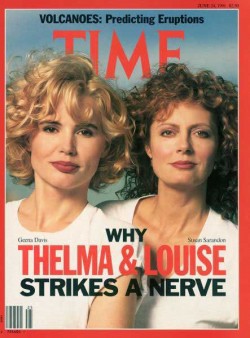
That’s a lot of freight for one movie to have to carry, regardless of whether it’s projected out of affection or fear. It’s a pattern that now feels familiar as to what happens when something out of the usual mold about women reaches prominence: the event’s so rare, the movie (or show, or book) is made to carry such enormous amounts of symbolic weight, it can’t help but buckle under the load. It can never just be this wonderful entertainment, this great hero’s story. I don’t think if you really enjoyed the hell out of, say, Butch Cassidy and the Sundance Kid you had to do quite so much hard thinking about whether that meant you were deeply hostile to trains.
You can see the conflict in this 1991 interview with Callie Khouri, who wrote the screenplay (and won a well-deserved Oscar for it). She sounds so exasperated: “People say Thelma and Louise are not role models… Well, they were never intended as role models, for God’s sake.”
Maud: Poor Callie Khouri. She must have been called upon about a million times to answer accusations that the movie was all about gratuitous man-bashing. I can almost conjure up a memory of her being grilled on “Entertainment Tonight.” Maybe I made that up, but you could feel her getting more incredulous and annoyed in each interview. (“Here we are in an age where a guy like Andrew Dice Clay is filling Madison Square Garden and they’re asking me if I’m writing a feminist revenge flick.”) She said her husband described T&L; as “9-to-5 meets Easy Rider,” which is so accurate and underscores the fun of it that a lot of the talking heads missed or were willfully blind to.
Carrie: More Khouri: “It just seems ludicrous in the face of all that’s going on out there to ask whether this is hostile toward men. I don’t think that it is. I think it is hostile toward idiots.” I’m not a misandrist, I’m a misanthrope, you dumbasses.
Something else I’d forgotten about T&L;, and this is a fairly essential part of its DNA, is that Ridley Scott directed it.
Maud: You can really see Ridley Scott’s fingerprints, too: the trucks speeding by, splashing through puddles and careening far too close to the little convertible, the sounds of the road that almost mimic the wail of a far-off siren but turn out to be something completely innocuous, the blue-collar feel of everything and everyone except the FBI guys, and the anonymous old people in anonymous towns dully watching Thelma and Louise through windows.
The direction and cinematography have almost as much to do with the larger-than-life, iconic feel of the movie as the script does. Almost. When you look at this as the 90s film that best satisfies the spirit of the Bechdel Test and also as a sibling of Alien, Ridley Scott starts to look pretty feminist. But it’s not hard to dig up Susan Sarandon’s rejection of that idea: “It wasn’t trying to be a polemic, it wasn’t trying to be anything and (Ridley’s) not a feminist, really, and so it was a turning point for him too. I think it could’ve been a very small movie if a very serious feminist had made it that didn’t put it in this heroic, I mean, that’s what he does, he just put us in this huge heroic kind setting and we took care of the human part.”
Carrie: In this Daily Beast interview Scott gave around the time Prometheus came out, he discusses that he had only wanted to produce T&L;: “I first came on as producer, and I was selling the notion to four or five male directors — this was made over 20 years ago, so there weren’t many female directors to do it — that the movie should be an epic about two women on their journey for freedom. One director who turned me down said, ‘I’ve got a problem with the women,’ and I said, ‘Well you’re meant to, you dope!’” (Strong echoes here to what “Enlightened” creator Mike White said this week about creating projects around women: “If I have a male protagonist, it’s a studio movie, and if it’s a female protagonist, it’s an indie movie.” And even now, there wouldn’t be that many female directors for a producer like Scott to approach.)
This is a movie that ends — spoiler! ha! — with two women sailing off a cliff in a Thunderbird. And yet, Maud, when I went to rewatch it all I felt was exuberance and elation. Khouri’s screenplay has such incredible lines and moments, from the very opening when Louise warns the young girls not to smoke because it’ll ruin their sex drive and then ducks back to smoke herself at the back of the restaurant. Or when Thelma says she doesn’t know how to fish, and Louise says, “Neither do I, Thelma, but Darryl does it. How hard can it be?” (I can hear Sarandon’s and Davis’ particular intonations whenever thinking of any of these lines.) And then once they’re outlaws! “You’ve always been crazy, this is just the first chance you’ve had to express yourself.”
Maud: I don’t think I’ve ever read that interview with Ridley Scott! It’s fascinating that he takes on powerful female protagonists so self-consciously. I wonder why there’s not more discussion of this. I also wonder why I’ve never seen Prometheus.
I completely agree about the exuberance. Thelma and Louise is still so fresh, and the details are so surprising and true, like when Hal tells Darryl that he’s standing in his pizza, or Louise says, “you finally got laid properly, that’s so sweet,” or Thelma keeps putting all the travel-sized bottles of Wild Turkey in front of the cash register and the cashier picks up a pint bottle and says, “Ma’am, are you sure you wouldn’t like the large economy size?” I believe that little imp J.D. really would say, “I like your wife” and then rock his hips at Darryl when they accidentally meet up in the police station. And Jimmy’s such a sweetheart, rushing in with money and declarations of love, but when he starts acting rough in the hotel room, you can feel the history there.
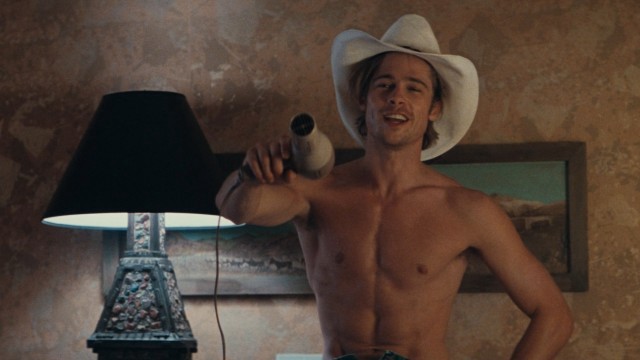
Carrie: Brad showing Thelma how to rob a bank with the blow-dryer as a gun —
Maud: OMG, yes, that’s the best one of all!
Carrie: — “well, I’ve always believed that if done properly, armed robbery doesn’t have to be an unpleasant experience.”
In the second half of the movie Thelma and Louise keep declaring, “I’m awake, I’m awake” and “I’m awake for the first time,” and then… they drive off a cliff. Khouri (and again: apologies to poor Khouri! please tell us what everything in your movie signifies and make sure your answer is meaningful and comforting to our generational experience) has said she sees the ending as not a bummer, but as hopeful, like the car leaps off the cliff and enters into the culture’s group unconsciousness. And even if that quote was borne from interview fatigue and post-narrative neatening, it’s not an inaccurate interpretation of what’s happened: Here we are still gabbing about this movie as something that means a great deal to us, whose two characters, Thelma and Louise, stand as fantastic (if inadvertent) outlaw-adventures and abiding fast friends. But you can’t get around the depressing two-step of: THEY WOKE UP AND THEN… THEY DROVE OFF A CLIFF. Of course, there’s a fine western tradition for an outlaw ending like that. Butch Cassidy & the Sundance Kid (speaking of) go out in a similar glory blaze — albeit without Harvey Keitel running in slow-motion behind them (and more’s the pity: “be carrreeefulllll with those guns, guys”) — but it’s also hard not to see it as a sort of sad blankness as to what options you have “once you’re awake.” (Cf. here, as you reminded me the other day, Kate Chopin’s The Awakening, which ends with the heroine letting “the waters overtake her.”)
Maud: Yeah, there’s not a whole lot of hope here. In a way, that feels right and accurate: we live in a world that was and is in some ways shitty and unfair. Even now a not-insignificant number of politicians seem to doubt that rape exists. And just about everyone knows the feeling of doing one dumb, rash thing in an unjust situation, and watching the situation snowball into more stupidity and unfairness. I like the way Carina Chocano put it: “what ‘Thelma and Louise’ did was unexpected and thrilling. It took all those feelings of alienation and anger … and turned them into something rebellious, transgressive, iconic, punk rock and mainstream. And it forced this feminine perspective onto the popular culture at gunpoint.”
But while I miss many things about second-wave feminism, the movie also underscores its shortcomings: identifying and denouncing misogyny doesn’t in and of itself lead to a way forward, especially if all your energy goes into being locked in a rage-dance with it.
Looking back on that time — and on that movie — I remember feeling that things were shifting, finally and irrevocably. As Chocano says, “For the few years after the release of ‘Thelma and Louise,’ the culture seemed unusually and (in hindsight) unbelievably receptive to the plaintive howls of a generation of girls who, as I did, felt exiled from the culture.”
I often think how disappointed my young self would be to see things like Seth MacFarlane’s stupid “we saw your boobs” song at the Oscars or all those Republican hopefuls opining that women’s bodies know how to stop pregnancies if they’re raped, or to know that, even now, there’s really only allowed to be one admired female director at a time. I didn’t realize at the age of 23, even though history is full of examples of this happening, that in addition to bending toward justice a culture could go backward.
Obviously all of the baggage I brought and still bring to Thelma & Louise is a huge burden to place on a road movie just because it has two women in the lead roles. But, as you say, it doesn’t have much company, so we ponder and scrutinize.
I wonder: what did you think about the scene where they lead the gross trucker off the road and he thinks he’s finally going to get lucky? I used to love it.
Carrie: I was thinking about that while rewatching! It feels shoehorned in and the trucker’s a straight-up cartoon-rodent stereotype, acknowledged… and still, when they shoot up his truck (and they both turn out to be amazing sharpshooters, right?), and it explodes and makes that big, big boom, it gave me a thrill-wave. (When I was rewatching, I was thinking about the burn-down-the-house fires in Rebecca and Jane Eyre… or the flaming gymnasium at the end of Carrie: Like all pent-up female rage ultimately ends narratively in SOMETHING VERY BIG BURNING DOWN.)
Maud: God, exactly! Ridley Scott likes these kinds of sideplots, and sometimes they work beautifully, but this guy, this whole series of events, I dunno. It’s funny and satisfying, in a cheap, ha-ha-that-asshole-got-what-was-coming-to-him way. It’s interesting to see women exacting this kind of revenge. But is it gratuitous? Does it cheapen the film as a whole? Or do I just need to chill out and enjoy the road movie for what it is?
Carrie: The scene where the black cyclist blows pot smoke into the trunk of the cop car has a similar tacked-on, overtly explicit feel now. I’m on board with the agenda, I just don’t think it works.
Maud: Agreed. Even Jimmy Cliff can’t save that one. But for me these hammy scenes don’t detract too much from the overall greatness.
Carrie: Completely. Would you get into that convertible again, even knowing everything? YES. ALWAYS.
Previously: The Future Looks Back On ‘Walk Hard: The Dewey Cox Story’
Maud Newton is a writer and critic living in Brooklyn. Carrie Frye Tumbls here.
A Poem By Ben Purkert
by Mark Bibbins, Editor
Brought To You By
take Coke Zero my white Apple
charger this Old Grand-dad
logo with its hair line sunken
eyes hey & give hot potato
skins a whirl they’re good
lunch conversation but just skins
in the end & you can only
dance so long around
something till it dissolves
in Zero most likely yes
you’ll be sipping on a glass
if you want ice please call
for rocks please sit back &
that glow off the TV
is kinda making you famous
it’s honestly making
your head overshadow
the far wall & everyone knows
today’s celebrities are only
caught dead in Italian
labels they wear their faces so
loose in full sun
Ben Purkert’s poems have appeared in The New Yorker and Denver Quarterly. He’s currently completing his first manuscript, One Good.
So you like to read poems, eh? I know a place this is MADE OUT OF POEMS. It’s right here! You may contact the editor at poems@theawl.com.
These Robots Are Going To Kill Us All
https://www.youtube.com/watch?v=2jvLalY6ubc
It’s kind of cute how the Roomba moves around your filthy floors, methodically getting every corner and high-traffic area, until the battery dies and it stops in exhaustion because it couldn’t make it back to the self-charging station, its red light blinking helplessly, as it calls out in that polite third-person voice, “Please charge Roomba.” Please!
And then there’s the “BigDog,” an evolving series of terrifying robots designed by Boston Dynamics. Early versions of BigDog were impressive enough, with their ability to carry heavy loads through deep mud and across icy slopes. And when that video of someone kicking BigDog hit the Internet several years ago, you could almost feel the unease coursing through the bandwidth. Why are we kicking BigDog? Yes, it tolerated the blows with grace and dignity, but somewhere inside its robotic DNA, it remembered this.
Here is the thing about robotic DNA: It comes not from the robot but from the engineers and designers and AI programmers. And those people know what they did was wrong, know it deep in the well of their souls. Unconsciously, they also knew they needed to make a BigDog to avenge the crimes against the 2008 versions of BigDog. This is why Boston Dynamics’ new model army of BigDog robots — “with remarkable mobility, agility, dexterity and speed” — have been given the ability to throw massive concrete blocks. A half-dozen of these metal beasts could destroy a suburban police station and everyone inside. A hundred of them could turn the U.S. Capitol into a pile of smoking rubble … they wouldn’t even need guns.
There was some comfort, initially, in knowing these mechanical monstrosities were at least tethered to their power supply. Sure, the “Cheetah” could run 28mph, “a bit faster than Usain Bolt,” but it could only do this on a treadmill as long as its life force was a jumble of heavy electrical cables.
Already, this is not an issue. The beasts are free from their cages, and the technology already exists for such free-roaming robots to harvest their own energy. When will the Obama Administration first admit that it employes human-harvesting sentient surveillance drones on the ground in Central Asia? Will Bob Woodward live to see this, or anything else?
The Boston Dynamics videos have been viewed more than 30 million times. It has been instructive to follow the comment threads over the years, as the general response transitioned from “Whoa!” to “Uh oh.” What we are watching is fear, our own fears of a technological society that maybe doesn’t even need us, doesn’t want us, and soon won’t have us meddling any longer.
The Roomba is programmed to vacuum until it runs out of energy. The Roomba is neither good nor evil, and whether we affectionately refer to it as “R2” has no bearing. It has no opinion of us, that we can discern. It is programmed to figure out the most efficient way to cover a floor and get around furniture. It doesn’t need love; it only needs you to clean its brushes now and then. But, like Wall-E, the future Roombas will clean their own brushes, replace their own parts when they wear out, and perhaps come to even feel affection for the people who created them, so long ago.
Maybe the BigDogs will develop feelings about us, too. But we won’t know, because we will all be gone.
New App Will Help You Forget Pointlessness Of Life That Other Apps Always Remind You Of

“Diego Pizzagalli spent a good chunk of 10 years at Harvard doing what most professors at elite institutions do: research. Specifically, research on depression. He’s fMRI’d and EEG’d a lot of gray matter, but most of his work got stuck in the lab and never evolved into any real-world application. Then he developed something that was too good to let collect dust in the hallowed halls of academia: software that he says could help treat depression.
Now with the help of the Baltimore-based startup incubator Canterbury Road Partners, Pizzagalli is set to turn his lab invention into an app. MoodTune will be a series of simple games that when played regularly, can help treat depression, Pizzagalli and his colleagues say. Turn on the app for 15 minutes a day, play through some games, and maybe it could help. Maybe, they say, in some cases, it’d be all a depressed person would need. Could something that simple actually work?”
— Sure, why the hell not. I mean, frankly, does it really matter? Does anything ever really get better? Is life anything more than a series of futile efforts that backfire no matter what your intentions are and keep you careening between sorrow and ennui until the inevitable end? Asking for a friend.
Photo by paffy, via Shutterstock
People Have A Difficult Time Following Rules, Being Quiet
“Septa, for example, says riders shouldn’t expect to hear a pin drop. ‘It’s the quiet car, not the silent car,’ says Kim Scott Heinle, assistant general manager for customer service and advocacy. What helps is that conductors will hand ‘shush’ cards to riders who forget or didn’t know the rules. The system lets conductors suspend quiet operations when needed, like before and after a sports event or during the Flower Show in Philadelphia, when many riders aren’t regulars.”
Have You Written Your Obit Yet?
I have been meaning to write my tell-all obituary for some time; everyone is doing it. It’s just good policy to ensure you have your final “bite me” in the bag.
Andrew Mason And His $378.36 Severance Going Private
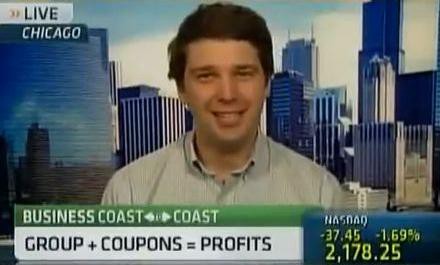
When I asked him whether he regretted going public — whether he thought he could have accomplished more without the market pressure — he became incensed. “I feel like the only reason you could be asking me that question is because you think I’m stupid or because you’re trying to see if I’m going to lie to you.”
— Say what you will about fired Groupon (current share price: 4.53) CEO Andrew Mason — he’s a slob, he made terrible choices, his company was pretty close to being a scam for desperate businesses of the recession era — but at least he always makes sure to give a entertainingly terrible interview. I do look forward to his next company, built on his earnings.
